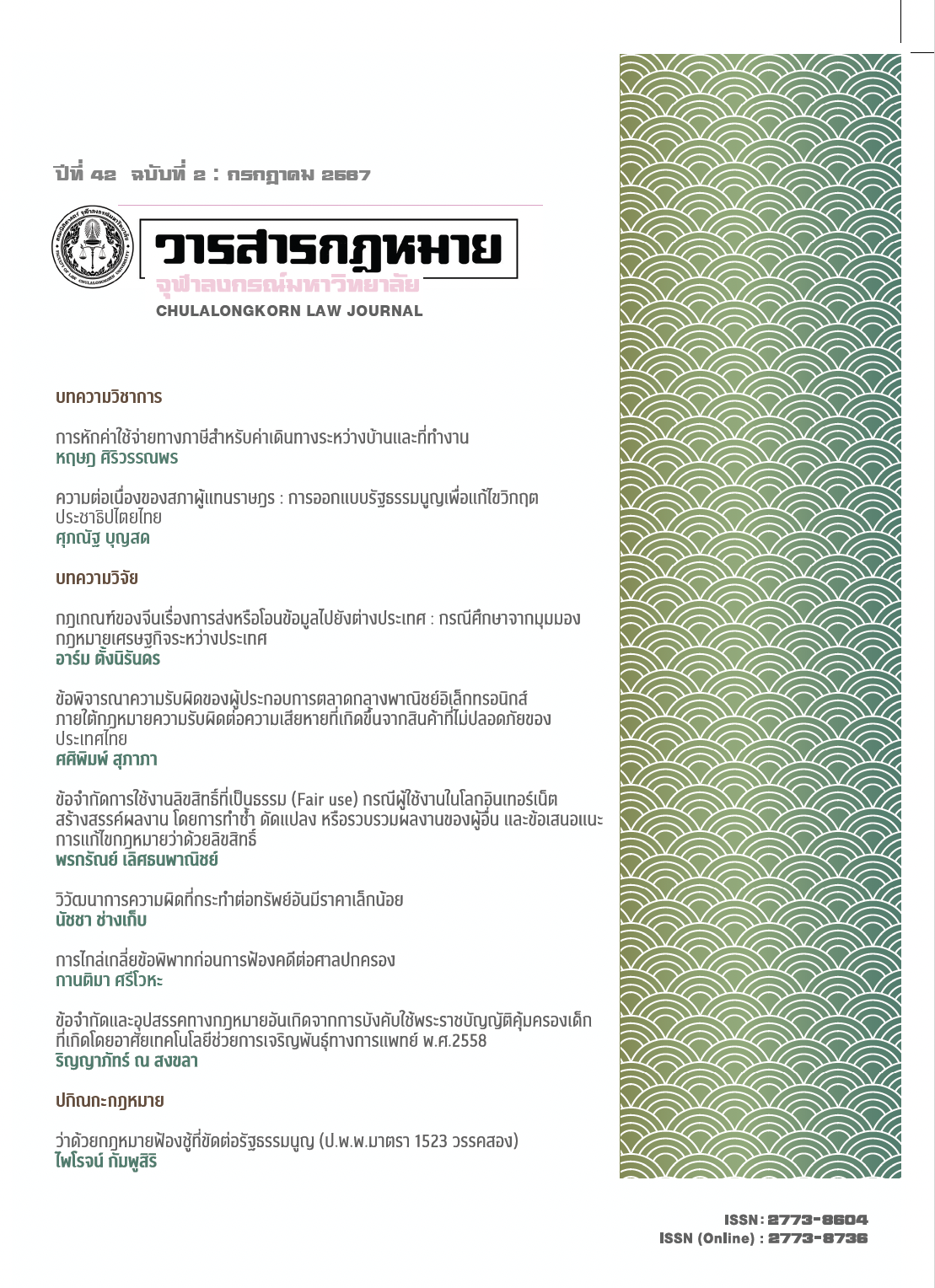ข้อจำกัดและอุปสรรคทางกฎหมายอันเกิดจากการบังคับใช้พระราชบัญญัติคุ้มครองเด็กที่เกิดโดยอาศัยเทคโนโลยีช่วยการเจริญพันธุ์ทางการแพทย์ พ.ศ.2558
Main Article Content
บทคัดย่อ
บทความนี้มุ่งศึกษาถึงข้อจำกัดและอุปสรรคทางกฎหมายที่เกิดขึ้นในกฎหมายว่าด้วยการใช้เทคโนโลยีช่วยการเจริญพันธุ์ทางการแพทย์ในประเทศไทย ซึ่งมีข้อจำกัดทางกฎหมายเกี่ยวกับสิทธิของบุคคลในการเข้ารับบริการและอุปสรรคทางกฎหมายในการใช้เทคโนโลยีช่วยการเจริญพันธุ์ทางการแพทย์ เพื่อให้สามารถบรรลุวัตถุประสงค์ในการสร้างครอบครัวทางพันธุกรรมที่สมบูรณ์ของบุคคลผู้ประสบกับภาวะการมีบุตรยากได้อย่างเท่าเทียมกันและมีประสิทธิภาพ
จากการศึกษาพบว่าพระราชบัญญัติคุ้มครองเด็กที่เกิดโดยอาศัยเทคโนโลยีช่วยการเจริญพันธุ์ทางการแพทย์ในปัจจุบันมีการบัญญัติถึงข้อจำกัดสิทธิของบุคคลผู้ที่มีบุตรยากและประสงค์จะมีบุตรโดยการใช้เทคโนโลยีช่วยการเจริญพันธุ์ทางการแพทย์นั้นจะต้องเป็นคู่สมรสที่ชอบด้วยกฎหมายเท่านั้นและในกรณีที่คู่สมรสที่ชอบด้วยกฎหมายนั้นมีคู่สมรสอีกฝ่ายหนึ่งมิได้มีสัญชาติไทยจะต้องจดทะเบียนสมรสมาแล้วไม่น้อยกว่า 3 ปี ตลอดจนอุปสรรคทางกฎหมายในการเลือกเพศของบุตรที่อาจมีความเสี่ยงต่อโรคติดต่อทางพันธุกรรมอันเกิดจากเพศ จึงนำไปสู่ความไม่เสมอภาค การเลือกปฏิบัติ ซึ่งไม่สอดคล้องกับหลักการสากลในรัฐธรรมนูญของทุกประเทศได้บัญญัติรับรองหลักการดังกล่าวไว้อย่างชัดเจน อย่างไรก็ดี การศึกษานี้มีข้อเสนอแนะเพื่อให้สอดคล้องกับแนวทางของสังคมไทย โดยเสนอให้มีการแก้ไขเพิ่มเติมบทบัญญัติที่เกี่ยวข้องกับข้อจำกัดและอุปสรรคของกฎหมายในกฎหมายว่าด้วยการใช้เทคโนโลยีช่วยการเจริญพันธุ์ทางการแพทย์เพื่อให้เด็กที่เกิดจากเทคโนโลยีช่วยการเจริญพันธุ์ทางการแพทย์ได้รับประโยชน์สูงสุดและมีมาตรการควบคุมการใช้เทคโนโลยีช่วยการเจริญพันธุ์ทางการแพทย์ให้เกิดประโยชน์และเป็นไปอย่างถูกต้องบนพื้นฐานของการเคารพสิทธิของบุคคล
Article Details

อนุญาตภายใต้เงื่อนไข Creative Commons Attribution-NonCommercial-NoDerivatives 4.0 International License.
ลิขสิทธิ์และเนื้อหาในเว็บไซต์ของวารสารกฎหมาย (รวมถึง โดยไม่จำกัดเฉพาะ เนื้อหา รหัสคอมพิวเตอร์ งานศิลป์ ภาพถ่าย รูปภาพ ดนตรีกรรม โสตทัศนวัสดุ) เป็นกรรมสิทธิ์ของวารสารกฎหมาย และผู้ได้รับการโอนสิทธิทุกราย
1. วารสารกฎหมาย ให้อนุญาตให้คุณใช้สิทธิอันไม่เฉพาะเจาะจงที่สามารถถูกถอนเมื่อใดก็ได้ โดยไม่มีค่าใช้จ่าย ในการ
- เยี่ยมชมเว็บไซต์และเอกสารในเว็บไซต์นี้ จากคอมพิวเตอร์หรือเครื่องมือสื่อสารผ่านเว็บบราวเซอร์
- คัดลอกและจัดเก็บเว็บไซต์และเอกสารในเว็บไซต์นี้บนลงคอมพิวเตอร์ของคุณผ่านระบบความจำ cache
- สั่งพิมพ์เอกสารจากเว็บไซต์นี้สำหรับการใช้ส่วนตัวของคุณ
- ผลงานที่ได้รับการตีพิมพ์โดยวารสารกฎหมาย จุฬาลงกรณ์มหาวิทยาลัย ถูกคุ้มครองภายใต้ Creative Commons Attribution 4.0 International License ซึ่งอนุญาตให้ทุกคนสามารถคัดลอก แจกจ่าย ดัดแปลง ส่งต่อ ผลงานได้ ก็ต่อเมื่อผลงานและแหล่งข้อมูลได้รับการอ้างอิงอย่างเหมาะสม
2. วารสารกฎหมาย จุฬาลงกรณ์มหาวิทยาลัย สงวนสิทธิ์ไม่อนุญาตให้คุณใช้สิทธิอื่นใดที่เกี่ยวข้องกับเว็บไซต์และเอกสารบนเว็บไซต์นี้ เช่น การคัดลอก ดัดแปลง เปลี่ยนแปลง ส่งต่อ ตีพิมพ์ แจกจ่าย เผยแพร่ จัดแสดงในที่สาธารณะ ไม่ว่าจะในรูปแบบใดก็ตาม ซึ่งเว็บไซต์หรือเอกสารบนเว็บไซต์ โดยไม่อ้างอิงถึงแหล่งข้อมูลหรือโดยไม่ได้รับอนุญาตเป็นลายลักษณ์อักษรจากวารสารกฎหมาย จุฬาลงกรณ์มหาวิทยาลัย
3. คุณอาจขออนุญาตที่จะใช้เอกสารอันมีลิขสิทธิ์บนเว็บไซต์นี้โดยการเขียนอีเมลล์มายัง journal@law.chula.ac.th
4. วารสารกฎหมาย จุฬาลงกรณ์มหาวิทยาลัย เข้มงวดกับการคุ้มครองลิขสิทธิ์อย่างมาก หากวารสารกฎหมาย จุฬาลงกรณ์มหาวิทยาลัยพบว่าคุณได้ใช้เอกสารอันมีลิขสิทธิ์บนเว็บไซต์นี้โดยไม่ถูกต้องตามการอนุญาตให้ใช้สิทธิ ดังที่กล่าวไปข้างต้น วารสารกฎหมาย จุฬาลงกรณ์มหาวิทยาลัยอาจดำเนินคดีตามกฎหมายต่อคุณได้ เพื่อเรียกร้องค่าเสียหายที่เป็นตัวเงินและคำขอชั่วคราวให้คุณหยุดการใช้เอกสารดังกล่าว ทั้งนี้ คุณอาจถูกสั่งให้ชดใช้ค่าใช้จ่ายใดๆ ที่เกี่ยวข้องกับการดำเนินการตามกฎหมายนี้
หากคุณพบเห็นการใช้เอกสารอันมีลิขสิทธิ์ของวารสารกฎหมาย จุฬาลงกรณ์มหาวิทยาลัย ที่ขัดหรืออาจขัดต่อการอนุญาตให้ใช้สิทธิดังที่ได้กล่าวไปข้างต้น โดยเชื่อว่าได้ละเมิดลิขสิทธิ์ของคุณหรือของผู้อื่น สามารถร้องเรียนมาได้ที่ journal@law.chula.ac.th
เอกสารอ้างอิง
Anastasia Grammaticaki-Alexiou, “Artificial Reproduction Technologies and Conflict of Laws: An Initial Approach”, in Louisiana Law Review, 60, 4 (2000): 1113-1121.
Choose the sex of your child, “Discover a convenient and innovative digital government experience,” [online] Available from : https://www.gov.il/en/service/national-gender-selection-committee [6 February 2023]
Fertility Center, “The progress for Surrogacy in South Africa,” [online] Available from : https://www.fertilitycentre.co.za/2022/06/01/the-top-eight-questions-people-have-about-the-process-of-applying-for-surrogacy-in-south-africa/ [16 March 2023]
For International Parents, “International Surrogacy Services, CREATIVE FAMILY CONNECTIONS,” [online] Available from : https://www.creativefamilyconnections.com/intended-parents/international-surrogacy [7 February 2024]
Gender Selection, “Gender selection can help patients have the family they’ve always dreamed of,” [online] Available from : https://fertilitycenterlv.com/fertility-treatments/gender-selection/ [22 February 2023]
Judy Siegel-Itzkovich, “Israel allows sex selection of embryos for non-medical reasons,” [online] Available from : www.ncbi.nlm.nih.gov/pmc/articles/PMC558118/ [25 March 2023]
Michelle J Bayefsky, “Comparative preimplantation genetic diagnosis policy in Europe and the USA and its implications for reproductive tourism”, in Reproductive Biomedicine and Society Online, 3 (2016): 41-47.
PART 7. SURROGACY AND DONOR FACILITATORS, ASSISTED REPRODUCTION AGREEMENTS FOR GESTATIONAL CARRIERS, AND OOCYTE DONATIONS
Pre-birth Parentage Orders, “Gestational Surrogacy in California,” [online] Available from : https://www.creativefamilyconnections.com/ us-surrogacy-law-map/california/ [7 February 2024]
Section 1 of Law on Agreements for Carrying Fetuses (Confirmation of Agreement and the Status of the Newborn) (Amendment No. 2), 2018
Section 1.1 of the Law on Agreements for the Carrying of Fetuses (Confirmation of the Agreement and the Status of the Newborn), 1996-55
Section 2 of Law on Agreements for Carrying Fetuses (Confirmation of Agreement and the Status of the Newborn) (Amendment No. 2), 2018
Section 3 of Act for Protection of Embryos (The Embryo Protection Act) Forbidden sex selection
Section 54 Parental orders of Human Fertilisation and Embryology Act 2008
Section 7960 of Family Code DIVISION 12. PARENT AND CHILD RELATIONSHIP [7500 - 7962] (Division 12 enacted by Stats. 1992, Ch. 162, Sec. 10.)
World Health Organization, “infertility,” [online] Available from : https://www.who.int/news-room/fact-sheets/detail/infertility [10 January 2023]
เสนีย์ ปราโมทย์, ประมวลกฎหมายแพ่งและพาณิชย์ว่าด้วยครอบครัวมฤดก พ.ศ.2508, (กรุงเทพมหานคร: สำนักพิมพ์จุฬาลงกรณ์มหาวิทยาลัย, 2508)
ข้อ 2 แห่งประกาศแพทยสภา ที่ 94 (5)/2558 เรื่องหลักเกณฑ์ วิธีการ และเงื่อนไขในการให้บริการเกี่ยวกับเทคโนโลยีช่วยการเจริญพันธุ์ทางการแพทย์ในการตรวจวินิจฉัยโรคทางพันธุกรรมในตัวอ่อน
ประสพสุข บุญเดช, คำอธิบายประมวลกฎหมายแพ่งและพาณิชย์ บรรพ 5 ครอบครัว, (กรุงเทพมหานคร: สำนักอบรมศึกษากฎหมายแห่งเนติบัณฑิตยสภา, 2553)
มาตรา 1459 แห่งประมวลกฎหมายแพ่งและพาณิชย์
มาตรา 18 แห่งพระราชบัญญัติคุ้มครองเด็กที่เกิดโดยอาศัยเทคโนโลยีช่วยการเจริญพันธุ์ทางการแพทย์ พ.ศ. 2558
มาตรา 19 แห่งพระราชบัญญัติคุ้มครองเด็กที่เกิดโดยอาศัยเทคโนโลยีช่วยการเจริญพันธุ์ทางการแพทย์ พ.ศ. 2558
มาตรา 21(1) แห่งพระราชบัญญัติคุ้มครองเด็กที่เกิดโดยอาศัยเทคโนโลยีช่วยการเจริญพันธุ์ทางการแพทย์ พ.ศ. 2558


